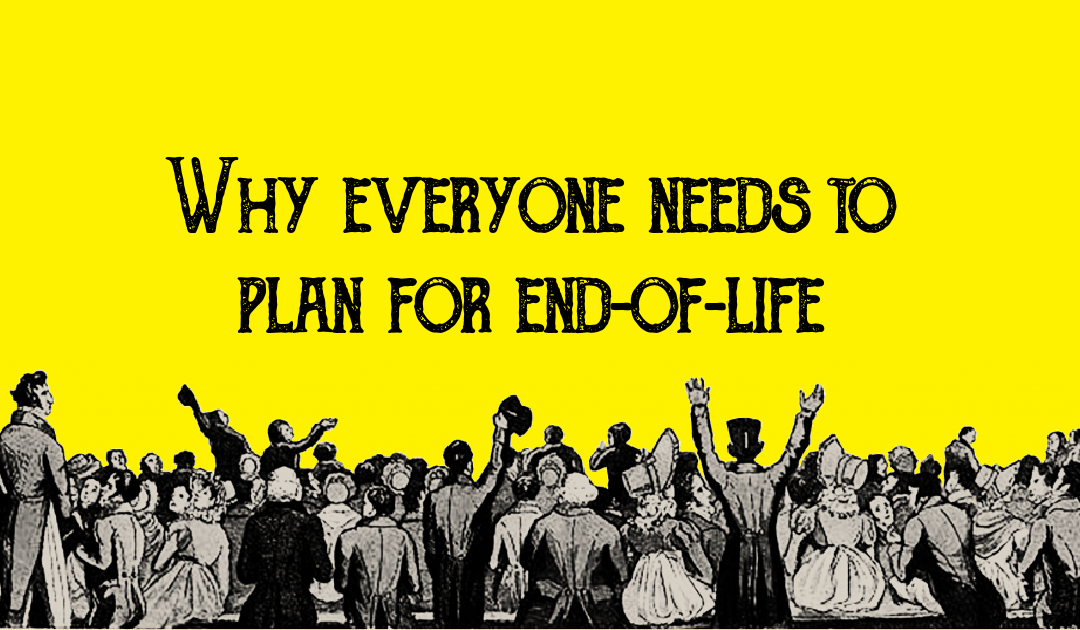When most people think of a plan for end-of-life purposes, they imagine old age. But dying and/or losing the ability to advocate for yourself or share your opinions on treatment options isn’t only for the elderly. Even though a lot of discussion surrounding end-of-life and advance care planning is aimed at older Australians, 34% of Australians die before the age of seventy five. That’s almost 55,000 people annually dying from illness, disease, accidents, disability, misadventure, crime, suicide and more. That’s a heck of a lot of people that might be dying without their end-of-life plans in place!
Without a plan for end-of-life, it’s difficult to make complex treatment decisions and provide you the kind of care you want. This increases the likelihood of trauma and suffering for your loved ones as they grapple with not only a premature or unexpected illness or death, but also with the medical decisions, legal arrangements and end-of-life administration in death’s wake.
Here at the Great Last Impression, we’re hoping to encourage everyone over the age of forty to plan for end-of-life choices to be as stress-free and autonomous as possible. We know that the idea of losing the ability to speak for yourself due to accident, illness, disability or disease is an uncomfortable topic. And that most active, spirited Australians don’t want to consider the idea of a premature, accidental or sudden death.
But we also believe that part of the reason why losing the ability to advocate for yourself can be so disquieting is because we often see the worst results through a lack of education, conversation and planning.
That’s why we’re highlighting why you need advance care planning even if you are not elderly or terminally ill
Disability is a club you can join at any time
Disability is indeed a club you can join at any time. And it’s a club that half of Australians join by retirement.
But disability and disease are not only friends of older Australians. One in six Australians have some form of disability. We can be born with or acquire disabilities throughout our lifetime via illness, disease, hereditary traits and accidents.
Unfortunately, our society is still built from an unrealistic and unrealised position of health. Even though many Australians with disability leave full and rewarding lives, ableism is a major feature within structures, systems and processes.
Within health, law and society, Australians with disabilities carry a higher burden of proof when it comes to proving capacity. This is partly because many of the systems are setup with unintentional bias. Take Voluntary Assisted Dying for example. As the current legislation stands, if you lose the ability to write down your desire to end your life through medical means, you’re likely to lose the ability to access Voluntary Assisted Dying.
And this is not the only area of concern.
We may have to advocate for access, opportunity and the right choose or deny treatments well ahead of time to ensure our needs are respected. Making a concerted effort to plan for end-of-life and the time prior to your actual death is intelligent and prudent.
This is why it is important to have an advance care plan and advance care directive that outlines your views on pain management, what treatments you would accept or refuse, and include information to offset the bias within the processes, procedures and systems you need to access.
Chronic illness is prevalent in our society
Chronic illnesses such as cancer, diabetes, stroke, dementia and heart conditions can all impact your quality of life. They can also impact your treatment choices throughout your life.
As someone with a chronic illness, you are likely quite aware that sometimes, your life continues in concert with health management and maintenance. Other times, your chronic illness is the central focus of day-to-day life and requires care and focus beyond your usual maintenance practices.
How you manage your chronic illness is a deeply personal and crafted experience. You’ve likely learned quite a lot of the management through trial and error. And it’s not always a job that an outsider, well meaning or otherwise, can slide straight into.
Documenting your care wishes via an advance care plan can ensure you receive the same attention to detail and quality care that you provide to yourself, even if you have to hand over the reigns for a little while. You can plan for end-of-life, temporary incapacity and progressive changes that chronic illness may bring without a loss of self-advocacy. That way, you can outline and receive the level of care you deserve and desire, no matter the impact your illness has.
You can be as prescriptive and granular as you like to ensure continuity of care and a balance between risk management and preserving your dignity.
The more adventurous your life, the higher the risk
A lot of people assume that they’ll never face health issues because they’re fit, active and eating all the right things. However, there’s a flip side to the whole active living that many people don’t consider. And that is, the more active you are, especially in sports where risk and contact are involved, the more likely you are to face injury or accidents that may change your health profile.
And this doesn’t only apply to keen rock climbers or anyone with a taste for UFC. Riding a bicycle in the city, a horse in the country, martial arts classes during the week or playing footy on the weekend come with their own set of potential problems. So too does a lifestyle filled with travel and other associated changes.
Plus, it’s important to remember that the reason why you remain fit, healthy and active is because you enjoy the lifestyle. Making your choices and preserving your dignity while also defining what risks are worth taking are a part of your life now. Why shouldn’t it be a part of your life if you have a change in circumstance?
You can advocate for taking risks that others may shy away from. For example, rollerblading as a form of fitness even if your carer is concerned about falls. It’s about having a plan for end-of-life or your care that outlines choices of the medical, sporting or physical kind that others may deem too risky where you are OK to accept the consequences.
Mental health is also a consideration
Two in every five Australians (43.7%) will experience a major mental health crisis in their lifetime. If you thought Britney Spears’ conservatorship was a terrible situation, never forget you may also face a similar fate. Australia doesn’t have a version of conservatorship that is quite so blatant. But the Australian equivalent varies state-by-state and is considered more complex and restrictive in some cases than what Britney experienced.
While we may have a fractured relationship with conversations about mental health and suicide in Australia, we need to have them. Many of the premature deaths that occur in Australia are due to suicide, addiction and issues that relate to mental health. Recovery from issues like addiction, mental health issues and suicidal ideation cannot happen without support or dignity. Outlining how you would like to be treated in relation to mental health may help you when you need it the most.
And that means a plan if you lose the ability to make choices due to mental health issues as much as it means having a plan for end-of-life care.

